There’s an article on Slate.com today by Ruth Graham entitled “Against YA.” The subhead reads
Read whatever you want. But you should feel embarrassed when what you’re reading was written for children.
I had considered just posting a link to the article on my Facebook page with the comment “screw you,” but decided that a more thoughtful response was required. Especially since Ms. Graham didn’t put much critical thought into her article, which meant that I would have to pull double duty logic-wise.
What seems to have rubbed Ms. Graham the wrong way is the fact that The Fault in our Stars is an amazingly successful book about to become a movie that makes a lot of money for just about everybody except the author whose book it is based upon if Hollywood operates the way it usually does. Ms. Graham did not like The Fault in our Stars, so Young Adult books are bad.
You Mad Bro?
Usually when I come across a hatchet job like this one, I tend to suspect an ulterior motive. Especially when the biography at the end of the article informs us that “Ruth Graham is a writer in New Hampshire.”
This should set alarm bells ringing. After all, which writer out there doesn’t feel jealous of other successful writers? I’ve said before that John Green haunts my dreams because he’s so successful and I’m not. I don’t begrudge him his success, though, because he’s earned it, but a week doesn’t go by that I wouldn’t love to have his reviews, let alone his sales figures. So is this article just an example of sour grapes from someone who hates an author who’s better than her?
On Amazon, the only living author listed named Ruth Graham is the daughter of evangelist Billy Graham and sister of hate preacher Franklin Graham. Since her works don’t really seem to be in the same category (they aren’t fiction, for one thing) I think we can decide that either the Ruth Graham who wrote the article is not the famous Ruth Graham, or that it’s not jealousy that drives her opinions. So I will give her the benefit of the doubt and take the piece as seriously as it deserves, which honestly is still not much.
De Re YA
Let’s first deal with one misconception about young adult literature (a term I hate) that seems to permeate Ms. Graham’s thinking. She treats YA as a genre.
I will admit that I introduce myself at panels and speaking engagements by saying “I’m Pab Sungenis, and I write books for boys.” But that doesn’t tell you what genre I write in. I’ve written urban fantasy (including two novels in the superhero subcategory), thrillers, and am currently in the middle of what I call a “bromantic comedy.” I’ve also written “cozy horror” but haven’t yet found a publisher for that one.
You see, what Ms. Graham doesn’t understand (which is also the case with a disturbing number of agents, publishers, and writers) is that YA is not a genre. YA is an audience. It’s a marketing construct. It’s a demographic shortcut.
I don’t write “young adult” books. I write books where young adults are the protagonists and people (mainly boys) from 13-21 are a targeted demographic.
YA authors, or at least those who are worth their salt, don’t write books for teenagers. They write books. Hopefully books that teenagers will like. One of the reasons that John Green is so ridiculously successful is that he doesn’t talk down to his readers. He doesn’t treat them as stupid. He gives them complex characters with real dilemmas who drive powerful plots. And he doesn’t soften up their rough edges (consider Takumi’s battle cry in Looking for Alaska for an example). This is also why adults often find his works so compelling; his characters are fascinating.
One agent actually told me five years ago that “no adult will read a book about teenagers.” I nearly choked on my glass of Coke as I reached for my copy of King Dork after hanging up on her. Too many people don’t understand that YA simply refers to the target demographic of a book, not its content.
The Fault in our Logic
Let’s move on to another problem with Ms. Graham’s cri de coeur (or is it more of a cri de rate since it seems to come from her spleen and not her heart?) and take a look at one reason she claims to look down on YA books.
Most importantly, these books consistently indulge in the kind of endings that teenagers want to see, but which adult readers ought to reject as far too simple. YA endings are uniformly satisfying, whether that satisfaction comes through weeping or cheering. These endings are emblematic of the fact that the emotional and moral ambiguity of adult fiction—of the real world—is nowhere in evidence in YA fiction. These endings are for readers who prefer things to be wrapped up neatly, our heroes married or dead or happily grasping hands, looking to the future.
I think this was the point when I considered that Ms. Graham either didn’t read the book, or skimmed through it quickly. “Satisfying?” “Looking to the future?” What future? Excuse me, but
SPOILER ALERT
Augustus is dead. Isaac is blind. Hazel Grace is dying. The author she idolized and whose book she employed as an emotional crutch (a) is an asshole, (b) has disowned that book, (c) was a prick to her and Augustus, and (d) is having an emotional breakdown in front of her. That is not “satisfying” on any level. No character gets any kind of satisfaction or anything near what they want. There is no future to be looked to, and the only hand grasped is Isaac’s as he is haltingly led around.
END SPOILERS
But this kind of thing is part of what makes The Fault in our Stars so good. It doesn’t cop out. It doesn’t treat the reader as someone who needs a big fluffy pillow to land on when the story comes to a screeching halt. It is a gut punch right where readers need it the most. It’s a book targeting teenagers about death and dying that doesn’t sugar coat anything. If I knew any teenager who had a terminal illness I would immediately give them a copy of this book and Somebody Up There Hates You just because it will make them laugh where they need to without treating them like… well… children!
Yes, there is escapist YA (Graham cites Twilight and Divergent as examples) and there is a place for it. There’s escapist fare for adults, too. But there is so much more. I’ve seen The Hunger Games and Catching Fire compared to The Red Badge of Courage and All Quiet on the Western Front, both deservedly so. The Harry Potter series is designed to give children a love of reading and grow with them, and the last three books can especially be considered adult fare.
And I will admit that, at heart, Sidekick is probably best described as escapist, but in the two books I also touch on growing up, drifting apart from your friends, child abuse including sexual abuse, teenage fatherhood, homelessness, and other “heavy” stuff. And the 12 year olds I’ve talked to as I’ve moved along promoting the books seem to be able to grasp this “adult” material. And the 30 and 40 year olds I’ve talked to don’t feel ashamed that they’ve found characters that they’ve grown to love just because the characters are much younger than they are.
What the Dickens?
Another thing that really disturbs me is that Graham offers up Charles Dickens as an example of complex adult literature, compared to the “shameful” YA.
Has she ever read any Dickens?
Dickens is about as formulaic as the worst YA out there. You can tell who the bad guys are because they are all either ugly or have disgusting names like “Uriah Heep.” The Good Guys always win and the Bad Guys always lose (or are reformed in the case of Scrooge). Even Sydney Carton who….
…nah. It’s a Victorian novel. I’m not posting a spoiler warning. Sydney Carton who dies on the guillotine says in his final words “it is a far far better rest [he goes] to than [he] has ever known.” It’s a happy ending for him.
Dickens’ work is so formulaic that there is a 30 episode radio comedy just making fun of his tropes.
There is no thought required in a Dickens novel. There are few complexities. There are no deep motivations or convoluted schemes. It’s escapist fare cut and dried. Just like Shakespeare (who wrote for the groundlings more than he did the crowned heads) the only reason we tout Dickens as great is because the dirt of intervening centuries has covered over the flaws in his work like so much snow in a graveyard. Because it is old, we assume it’s art. Spoiler: it isn’t.
Conclusion
I can’t help but feel that perhaps I’m being a little defensive because I write YA, and that perhaps I’m taking her comments as insulting my work by association. But I really think it goes deeper than that.
The illiteracy rate in the county where I live is over 20%. One out of every five people around me cannot read. The rest of the country is not much better. I find it hard to criticize anyone who reads anything nowadays. And one should never be ashamed to read what they like.
There are different types of books for different people. There are tons of genres. And some of those books target teenagers. But I can honestly say that most of the YA books I’ve read in recent years have better and more complex characters than any of the “adult” fare I’ve read.
If Ms. Graham wants to see adults reading more books aimed at them… well… maybe she and the other “adult” authors ought to write better stuff for them to read.
Leave a Comment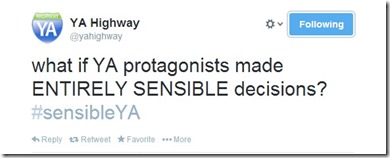
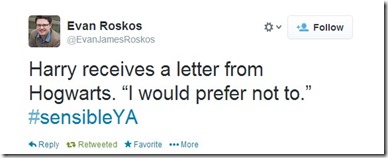
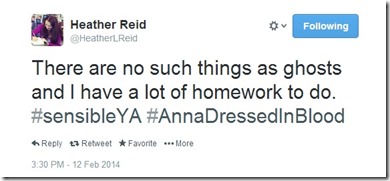
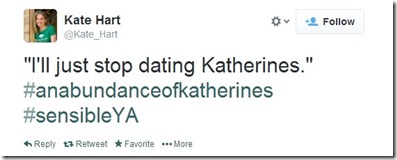
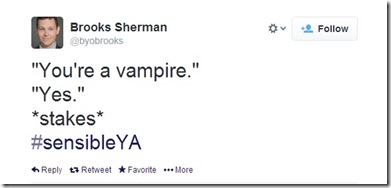
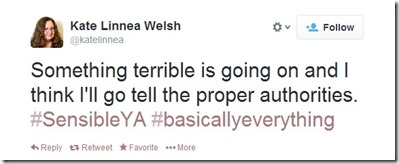
 In the past several years, I’ve gone through what, to me, had to be three of the most disappointing Young Adult trilogies ever.
In the past several years, I’ve gone through what, to me, had to be three of the most disappointing Young Adult trilogies ever.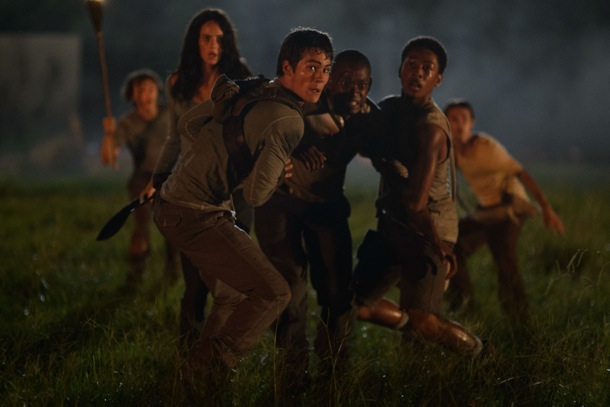 Mockingjay is a complete departure from the formula of the other Hunger Games books. It’s the story of the new rebellion and the fall of the Capitol. The Districts cease to exist as they are, and we hardly even visit District 12 at all until the very end. Plus, the characters that everyone loves are all killed or mentally raped before the end. Nothing Will Ever Be the Same.
Mockingjay is a complete departure from the formula of the other Hunger Games books. It’s the story of the new rebellion and the fall of the Capitol. The Districts cease to exist as they are, and we hardly even visit District 12 at all until the very end. Plus, the characters that everyone loves are all killed or mentally raped before the end. Nothing Will Ever Be the Same.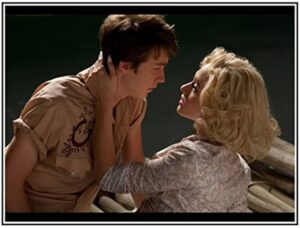 It really doesn’t have to be that way. Let’s look at another hot fantasy YA series, the Caster Chronicles. Kami Garcia and Margaret Stohl also built an expansive and fascinating universe with well-rounded characters and intricately designed supernatural species. The first book ends with the Nothing Will Ever Be the Same moment, when it looks like everything we knew was wrong, but the rest of the series is all about restoring the order of things. When the story reached its logical end in Beautiful Redemption, not only had all the characters grown and matured, but everything had been put back the way it was before it was broken. None of the characters will be the same again, but the world will!
It really doesn’t have to be that way. Let’s look at another hot fantasy YA series, the Caster Chronicles. Kami Garcia and Margaret Stohl also built an expansive and fascinating universe with well-rounded characters and intricately designed supernatural species. The first book ends with the Nothing Will Ever Be the Same moment, when it looks like everything we knew was wrong, but the rest of the series is all about restoring the order of things. When the story reached its logical end in Beautiful Redemption, not only had all the characters grown and matured, but everything had been put back the way it was before it was broken. None of the characters will be the same again, but the world will!